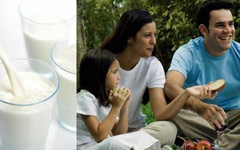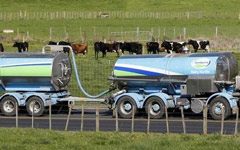Milk firm plans to revolutionize dairy sector
By Cecily Liu in London (China Daily) Updated: 2014-11-17 07:51The internal system that monitors and checks the quality of milk throughout the entire production chain at FrieslandCampina is known as Foqus.
That chain begins at members' dairy farms, where the milk being collected by truck is tested for antibiotics, irregularities, temperature and color.
 |
| Top 10 dairy companies in the world |
 |
| Investors acquiring thirst for dairy assets |
A laboratory then examines the milk from individual dairy farms to assess a wide range of factors including bacterial count, somatic cell count, sediment, butyric acid, freezing point, chloroform, and free fatty acids.
In China, FrieslandCampina is best known for its infant formula brand Friso, with sales of about 3 billion yuan a year. Before 2008, most of the Friso milk formula was sold in China through a dealer, but a burgeoning market demand for Friso has prompted FrieslandCampina to establish a Shanghai subsidiary to manage Friso sales.
However, the Friso infant milk formula sold in China is different from the European version, because Chinese regulators have created different guidelines for infant milk formula that are more appropriate to the Chinese diet.
Consequently the company's research and development team has created a version of Friso that suits Chinese requirements.
But two years ago, FrieslandCampina faced a crisis when the Dutch version of Friso was sold in the Chinese market. It was sold by Swiss Food company Hero Group, which bought the Benelux market distribution rights of Friso from FrieslandCampina about seven years ago, Hart says.
That act by Hero posed a huge challenge to FrieslandCampina because many Chinese consumers confused the two. Consequently, FrieslandCampina bought back the Benelux distribution rights of Friso, Hart says.
FrieslandCampina in Shanghai now has about 500 employees who work in sales and marketing. They also work with Chinese distributors located in each province.
In addition, FrieslandCampina has established a subsidiary in Beijing in charge of selling dairy ingredients including whey powder and GOS, a prebiotic, which is an element that promotes digestion. These ingredients are sold to Chinese dairy companies so they can make their own dairy products, and sales are now worth about 1 billion yuan a year.
A third FrieslandCampina subsidiary in Hong Kong focuses on both retail products and business-to-business sales to restaurants.
FrieslandCampina's involvement in China was given a boost in March when Chinese president Xi Jinping visited the Netherlands and visited the company, and Hart told him about the Dutch approach to dairy products.
"I had a half-hour meeting with the president, and we were able to present him our grass-to-glass concept," Hart says.
Another significant FrieslandCampina involvement in China is its investment in setting up the Sino-Dutch Dairy Development Center last November to help improve dairy production, safety and quality levels throughout the entire dairy chain in China, together with Wageningen University & Research Center and the China Agricultural University.
FrieslandCampina's keen desire to grow in China comes after a late entry into the country compared with many other Western dairy brands.
But Hart says that may be to his company's advantage, as the market is now more developed and FrieslandCampina can bring to China products and approaches best for market conditions today.
- Cash crunch fans expectation on RRR cut
- US extends antidumping duties on China's thermal paper
- Modern food van with ancient look in Shanghai
- China home prices continue to cool in November
- Asia's top 3 billionaires all Chinese
- Old investment remedy the treatment for China's "new normal"
- China's solar sector opposes US anti-dumping ruling
- BMW to recall 846 cars in China
















